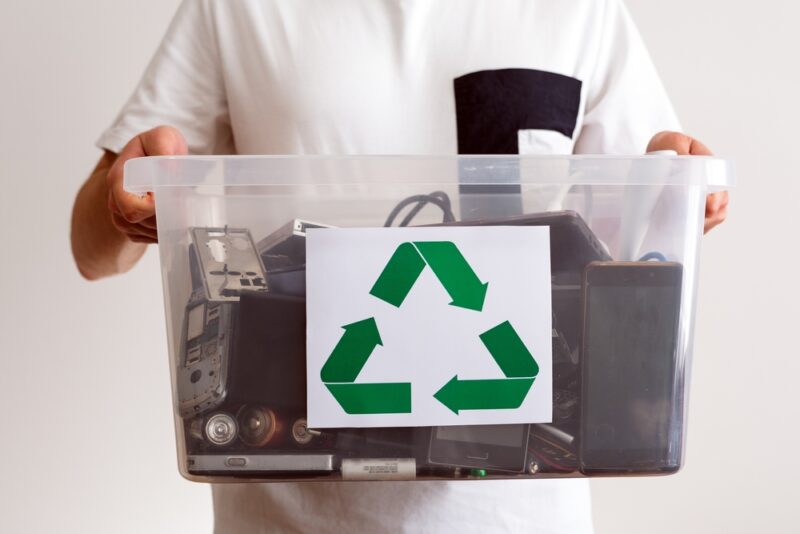
Recycling electronics has become a crucial task in our technology-driven world. As gadgets and devices fill our homes and offices, recycling becomes more critical than ever.
Not only does this help reduce electronic waste, but it also conserves valuable resources and protects our environment.
This guide covers everything you need to know about recycling electronic waste, from the benefits to the processes. It also shares tips to ensure the secure destruction of data.
Why Recycling Electronics Matters
In today’s digital age, devices are upgraded frequently, resulting in significant electronic waste. However, recycling helps prevent harmful materials from polluting the environment.
Many electronics contain toxic substances like lead, cadmium, and mercury. If improperly disposed of, these substances can enter the soil and water.
Recycling also helps recover valuable materials. Many devices contain precious metals like gold, silver, and copper. Professionals can extract and reuse these materials, conserving natural resources.
How to Recycle Electronics
It involves several steps to ensure materials’ safe and efficient recovery. Here’s a breakdown of the typical process:
- Collection and Transportation: Consumers can dispose of their old electronics at collection bins and drop-off points and transport them to a recycling facility.
- Sorting and Assessment: The electronics get sorted by type and condition upon arrival. Devices get assessed for potential refurbishment or direct recycling.
- Disassembly and Separation: Professionals dismantle your devices and separate components like batteries, circuit boards, and screens.
- Electronic Destruction, Shredding, and Recovery: Components are shredded into smaller pieces to facilitate material recovery. Professionals use advanced techniques to extract metals and other valuable materials.
- Processing and Refining: Recovered materials are processed and refined to meet industry standards. They are then sold to manufacturers to create new products.
Ensuring Secure Destruction
One primary concern when recycling these devices is ensuring the secure destruction of personal data. Devices like computers, smartphones, and tablets often store sensitive information that owners must protect.
Data destruction services erase data before recycling. Here are some methods used in these services:
- Data Wiping: In this method, specialized software overwrites existing data. As a result, any data will be unrecoverable.
- Physical Destruction: Hard drives and other storage media get physically destroyed. This method ensures nobody can access data.
- Degaussing: A strong magnetic field gets applied to disrupt the magnetic domains on the drive, effectively erasing the data.
Choosing a reliable data destruction company to handle your devices is essential. Companies like ours provide certificates of destruction and use industry-standard practices to guarantee data security.
The Role of Legislation in Recycling Electronic Waste
Governments worldwide enact legislation to encourage recycling electronic waste to reduce its environmental impact. These regulations usually require manufacturers to take responsibility for the end-of-life disposal of their products.
Laws like the Resource Conservation and Recovery Act (RCRA) and state-specific e-waste regulations manage electronic waste recycling in the country.
Why Choose Us for Your Electronic Recycling Needs
When it comes to recycling e-waste, selecting the right company is essential. Here’s why you should choose us:
- Certification and Compliance: We are certified by recognized bodies such as NAID (National Association for Information Destruction). Our services strictly comply with industry standards and regulations, ensuring the highest level of security and environmental responsibility.
- Comprehensive Services: We offer a wide range of services to meet your needs, including on-site data destruction for maximum security. Our holistic approach ensures that every aspect of electronic recycling is covered.
- Transparency and Processes: We are committed to transparency in our electronic recycling and data destruction methods. We provide a detailed explanation of our procedures, so you can be confident that your security requirements are met.
The Future of Recycling E-waste
The future of recycling e-waste looks promising, with technological advancements and increasing awareness driving positive change. Innovations in recycling techniques and materials recovery will enhance efficiency and reduce costs. The growing demand for sustainable products encourages manufacturers to incorporate recycled materials into their designs.
As consumers, we also play a significant role by supporting businesses that prioritize sustainability and choose to recycle electronics responsibly. We can help create a circular economy to reuse resources and minimize waste.
Safeguard Your Data with Professional Services
Recycling e-waste is not just an environmental responsibility. Instead, it’s a crucial step towards a sustainable future. Ensuring secure e-waste recycling protects our personal information and contributes to a cleaner planet.
Data-Destruction offers reliable services to guarantee the safety of your data. Whether you need on-site data destruction or comprehensive recycling of electronics, we’re here to help. Join us in making a positive impact, and contact us today!